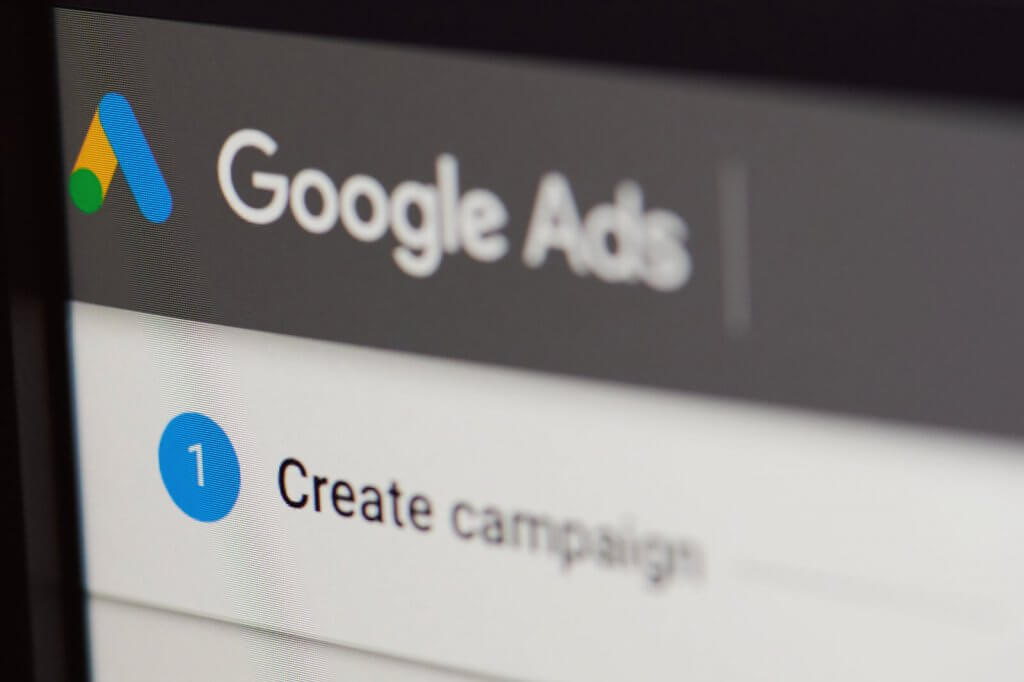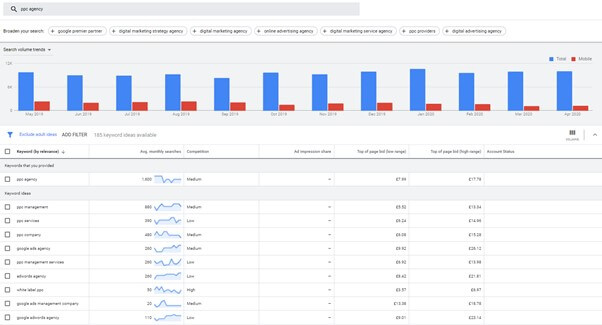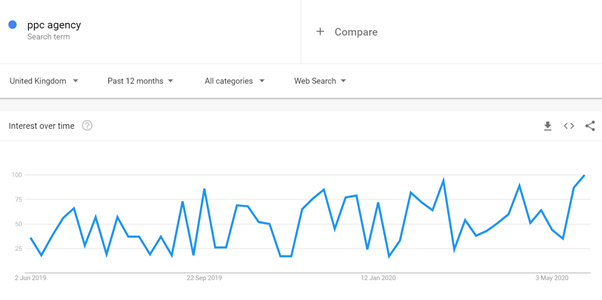What is PPC management? The seven-point mega guide
Are you wanting to find out what is PPC management? Then you’ve come to the right place!
PPC management is where either one marketer or a team of marketers oversees the advertising of a PPC (Pay Per Click) account. There are generally seven areas that a PPC management agency will cover when overseeing a PPC marketing account, even though much more work is required. There are seven broad areas that a good PPC management process will follow:
- Goal identification and tracking
- Campaign creation
- Budget pacing and management
- Reporting
- Optimisation
- Competitor analysis
- Testing
1. Goal identification and tracking
Firstly, when it comes to PPC management, it is crucial to identify what you’re trying to achieve with PPC marketing and how you’re going to accomplish this. Of course, the top-level goal of most businesses will be to increase profits. This then filters into increasing revenue or leads.
To increase your revenue or leads, you need to look at your business’s operating costs and how much you can afford to spend before you achieve a sale. You can then use various metrics to determine how many sales you need to get to make the time spend on PPC management worthwhile. You also need to look at multiple metrics that will help you to calculate what level of return you require from PPC advertising, how much you will need to spend, and whether your estimated targets are even achievable.

Here are some metrics that you will come in handy when you are creating your PPC advertising goals and targets:
Cost per acquisition (CPA)
Your CPA shows how much you can afford to spend on PPC media spend before you need to get a conversion. It can be very useful for businesses looking to get leads from their PPC advertising.
If you are an e-commerce business with products with different values, then this may not be the right model to choose from. This is because, unless you have a different CPA target for each product type, you are valuing every conversion the same. For example, this would mean that you are valuing a sale of a £100 jacket the same as a £15 t-shirt.
CPA = Cost / Conversions
Return on Ad Spend (ROAS)
ROAS shows the amount of return that you’re getting from your PPC advertising. It shows the number of times greater your revenue is to your PPC ad spend. For example, if your media spend is £100, and you get £500 in revenue, then your ROAS would be 5. This means that your revenue is times as much as your PPC ad spend.
A ROAS target is especially beneficial for e-commerce businesses that sell products at multiple different price points. This is because, unlike a CPA target, a ROAS target takes into account the different revenue amounts of each product.
ROAS = Revenue / Cost
Number of leads/sales/revenue
Looking at your profitability per product with either a CPA or ROAS target is good to ensure that your PPC management efforts are profitable. However, you also need to increase the sales or revenue that you’re getting. This is why it is crucial to identify a goal for the number of leads you need to obtain if you are a lead generation business. E-commerce businesses should be identifying the number of sales or revenue that they should target
Conversion Rate (CVR)
CVR shows the percentage of people that land on your website and then make a purchase. Identifying a CVR will help you to determine whether your ROAS or CPA targets are achievable and also whether you can even make PPC a profitable channel. If your conversion rate is too low, then you will most likely need to bid on more keywords or be aggressive with your bids to bring in more traffic to secure the number of leads or revenue required to make your PPC management worthwhile.
CVR = Conversions / Clicks
Average Order Value (AOV)
Your business’s AOV shows how much people generally tend to spend when they make a purchase on your website. Increasing the number of people purchasing products on your website is beneficial. Still, another way to increase your revenue is to get your customers to purchase more items from you when they do buy from you. Increasing your AOV means your CVR doesn’t need to be as high to make your PPC management profitable.
AOV = Revenue / Conversions
Average Cost of Sale (ACOS)
The average cost of sale (ACOS) is another metric used to help PPC management companies to calculate how much they can spend before they need to get a sale. ACOS shows the percentage of your revenue that is eaten up by your PPC ad spend. So, for example, if your PPC advertising efforts bring in £500 in revenue and you spend £100 in PPC ad spend, then your ACOS is 0.2 (20%). His means that you made £500 in revenue, but 20% of the revenue was taken up in PPC ad spend.
ACOS = PPC ad spend / Revenue
Customer lifetime value (LTV)
To be able to calculate the full value of your PPC management efforts, it is vital to calculate the average lifetime value of a customer. This metric looks at how much recurring business you’re likely to get from each customer. It will vary depending on your specific business niche.
If you run a subscription service, then you would be looking to calculate how many months n average customer normally stays with you. You wouldn’t be getting the full value of your PPC management efforts if you just take the value of one month’s worth of subscription membership. If you sell clothing, then it is likely that once a customer has found your business and has purchased a product from you, that they will purchase another product sometime in the future. In this case, if you can work out the average number of times a customer orders another product from you within a year and how much they tend to spend, then you can factor this into your PPC advertising goals.
Calculating your Customer Lifetime Value is different depending on your business niche, the quality of the data that you have available to you, and your business offering. However, here are a few very basic formulas that you could use to begin working out your Customer Lifetime Value:
Customer Lifetime Value formula 1 = AOV * Average annual purchase frequency rate
Customer Lifetime Value formula 2 = AOV * Average monthly subscription duration
2. PPC account creation
The second element of successful PPC management requires getting the PPC advertiser set up so that they can start using Google Ads to advertise their business. Some businesses will need more help in getting set up than others. The setup process can be broken down into three main categories:

Create PPC account
The first step is to create a Google Ads account so that the advertiser can adding in their targeting criteria. Most PPC advertisers will start with advertising on Google Ads due to its unrivalled amount of potential volume.
If you’re using a PPC management agency, then they will most likely ask you to create a Google Ads account and then share read-only access with them. This is because the Google Ads account creation process requires adding In some details that may be private such as the business’s payment card details so that they can pay for their PPC advertising.
Once the business has created a Google Ads account, they can share access to the PPC manager’s Google Ads account. This will allow the PPC manager to oversee your Google Ads account without having your main login details. You can share access to your PPC manager by clicking on ‘Tools & Settings’ on the top right of Google Ads and clicking on ‘Account access and security.’
|
|
If you’re working with a PPC management agency, then part of the account creation process will involve agreeing on who pays the Google Ads advertising fee. Most PPC management agencies will ask that the business pay the Google Ads advertising fee, and then the PPC management agency will invoice them separately for their management fee. This is the most popular option and the one that we would recommend. The other option is for the PPC management agency to pay the business’s Google Ads advertising fee and then to invoice both the Google Ads advertising cost and the PPC management fee to the business.
Keyword research
Once the Google Ads account has been created, keyword research needs to be carried out to determine what keywords you’re going to go after. The exact keywords that you target will depend on your budget, business niche, and your PPC goals.
If you have a smaller budget, then you may choose to go for lower-funnel keywords. This is because lower-funnel searches are where the user is closer to completing a purchase, and therefore you will likely have a higher return on investment with these keywords.
If you have a larger budget, then you can afford to go after both lower funnel and upper-funnel keywords. Upper funnel keywords will make people aware of your business when they are early on in their sales journey. Upper-funnel keywords tend to have lower click prices as they have less competition.
To do your keyword research, a good place to start is to look at your website and think about what keywords someone may search for if they were looking for a business like yours. Once you have a handful of keywords that you feel are relevant to your business, you can expand your list by typing your keywords into Google Keyword Planner.
To access the Google Keyword Planner tool, you need to have a Google Ads account. Within Google Ads, the clock on ‘Tools & Settings’ and then on ‘Keyword Planner.’ Google’s Keyword Planner tool gives you other keyword variations to the ones that you have added. It also gives you an idea of the monthly search volume for those keywords, how competitive they are, and roughly how much you would need to bid on to be able to compete on those keywords. You can use this information to decide which keywords you want to target.

A good PPC management agency will continue to perform keyword management by continually looking for new keyword opportunities to target even after the account goes live.
Campaign creation
Once you have decided on the keywords that you want to target and goals, then a PPC manager will create your campaigns using your chosen keywords.
1. Keywords are easy to find
They will structure your keywords in a way that will make them easy to find and in a format that makes adding new keywords simple to do.
2. Better Quality Score
The campaign structure is very important for the success of an account. A poor account structure will make it more challenging to write the best ad copy for each keyword variation, which could result in a poor click-through rate and Quality Score. Your keyword Quality Score is a score given by Google on each of your keywords. A poor Quality Score means higher click prices.
3. More insightful reporting
Another benefit of having a good PPC campaign structure is that it makes your PPC reporting more insightful and useful. If your campaigns are not easily labelled or keyword groups are not separated very well, then it is difficult to create a report that properly segments that data in a way that is useful to you. A basic example is if you create a separate campaign for your search keywords, Shopping campaign, and Display advertising, then you can easily segment your data by Search, Shopping, and Display within your reports.
3. PPC Budget pacing and spend management
PPC spend management and budget pacing to ensuring that your PPC account spends as close as possible to your targeted monthly spend is one of the more basic elements of PPC management.
Monitoring PPC spend can be tricky. Many businesses see fluctuations in performance, depending on the time of the year. They, therefore, have a different budget for each month of the year. For a PPC management agency, this means that they need to make sure that the spend levels reflect the monthly spend targets that are set.

Check spend at the start of the month
A PPC manager will look at the spend target at the start of the month and will decide as to whether the account is in a position to hit the targeted monthly spend. To do this, they will look at how much the account spend last month and consider seasonality. To get an idea of seasonality and to determine if searches will increase or decrease this month compared to the previous month, one option is to look at Google Trends data. This is a free tool offered by Google that gives an idea of the changes in search volume for a given search term.

If you have been running PPC advertising for over a year, then another option to get an idea of search volume is to look at your search volume during this month last year.
Once the PPC marketing agency has worked out whether aggression needs to be increased, reduced or remain the same, they will make changes to the account so that the account is in a good place to spend the targeted amount. If spend needs to be reduced, then the PPC manager may choose to drop bids on the poorest performing keywords, pause the poorest keywords or ad groups. If the business sells a variety of products, then the PPC manager may choose to bring down spend by pausing the campaigns that focus on the product groups that do not sell well in that month.
PPC spend tracker and projections
Aside from making changes to the PPC account at the start of the month, a PPC manager will monitor the spend levels throughout the month. They will make changes to the PPC account if it looks like it isn’t projected to spend the targeted amount.
If spend changes need to be made, then they should be made early on. If an accounts spend issue is spotted near the end of the month, then more drastic changes will need to be made. However, if you spot an account spend issue early on in the month, then you’ll probably only need to make a smaller tweak to your spending levels.
A good PPC management agency will have processes and tools in place to be able to monitor and project send levels throughout the month. There are many ways to monitor how much you’re spending on PPC advertising and also to calculate your projected end of the month spend levels. Here are two basic ways that you could use to try to project your monthly PPC spend:
Method 1 – Calculate the average daily spend
The simplest way to project how much you are likely to spend is to calculate your daily average spend and then multiply it by the number of days remaining in the month. This will give an idea of how much more you’re likely to spend by the end of the month. You can then add on what you’ve already spent on this figure.
Daily average spend = This months spend so far / number of days passed in a month
Remaining spend this month = Daily average spend * number of days remaining this month
Projected spend = current spend + Remaining spend this month
While this method gives a basic idea n how much you are projected to spend, bear in mind that your daily average spend may not be very accurate if you have made some aggressive spending changes recently.
Method 2 – use the last seven days to calculate daily average spend
Another method is to use the last seven days to calculate your daily average spend. This way, your average daily spend is less likely to be skewed when you recently make an aggressive spending change.
This method is very similar to method one. The only difference is how you calculate your average daily spend:
Daily average spend = Spend in the last seven days / seven
Remaining spend this month = Daily average spend * number of days remaining this month
Projected spend = current spend + Remaining spend this month
4. Reporting
While reporting on your PPC advertising performance isn’t necessary to run a PPC account, it is vital for successful PPC management. Without reporting on your PPC performance, you have no idea how well your PPC management efforts are doing.
Looking at the performance of your PPC management efforts will show you how close you are to achieving your PPC goals. Once you start looking at your PPC reports, you may realise that your initial goals and targets were too optimistic.

A good PPC report will not only show you how well you’re performing against your goals and targets. It will also help you to find the opportunities within your PPC account and determine what needs to be done next to improve your PPC marketing further.
An excellent tool to help you create a PPC report is Google Data Studio. It is a free tool offered by Google that can automatically sync up to Google properties such as Google Ads, Google Analytics, and Google Sheets. You can use Google Data Studio to create interactive reports that updated in real-time.
Here are a few of the things that you should be reporting on:
Top-level metrics
Look at some of the top-level PPC related metrics such as impressions, clicks, and cost.
PPC optimisation metrics
Calculated metrics that you can optimise to get more from your PPC advertising efforts. These include CPC, CTR, and CVR.
Calculate profitability
Metrics that look at how profitable you’re your PPC management efforts have been. These include sales/leads, revenue, ROAS, CPA, and ACOS.
Spend and spend pacing
Your PPC media spend so far and projecting how much you are likely to spend by the end of the month can be useful to see. Your projected media spend should be compared with your target media spend. You don’t want to be drastically overspending or underspending compared to your targeted spend by the end of the month. The earlier you spot spend issues, the sooner you can rectify them.
Performance comparison
I like to look at three different metrics when making a judgment on how well our PPC management is performing. I want to compare performance with the previous week (WoW), performance with the same month last year (MoM), and the performance of the PPC advertising compared to your PPC goals.
Performance by campaign type
Your PPC account is likely to have several different campaign types. The performance and goal of each campaign type are likely to be different. For example, your Display campaign is likely to have a much lower conversion rate than your Search or Shopping campaigns. However, with your Display campaign, your goal is more likely to be to increase your brand awareness. Being able to segment your PPC account performance by brand, non-brand, Display, Shopping, and Video will allow you to see how each campaign type is performing and where further work is required.
Performance by other dimensions
Google Ads allows PPC advertisers to segment the performance of their accounts in many different ways. You can look at the performance of your account by the time of the day, gender, age group, and device, to name a few examples. Being able to see this data in a well laid out report will help you to find out where your account performs well and where it needs more work.
5. Optimisation
Carrying out basic optimisations on your PPC account will allow you to get more out of your PPC management efforts. Many things can be done to optimise a PPC account. Here are three suggestions:

1. Bid optimisation
A PPC manager will monitor your keyword performance and ensure that you’re bidding the right amount for each keyword.
Profitability
PPC managers will look at the historical performance of a keyword to decide whether it is profitable or not. If it is not profitable, then they may choose to drop its bid. This will mean that the keyword gets less exposure by either appearing less often, appearing further down the page or a mixture of both. If the keyword is highly profitable, then the PPC manager may decide to increase its bid. This should give the keyword more exposure resulting in more traffic coming in from this keyword.
There are a few formulas that PPC management agencies can use to help them to calculate the right amount to bid on a keyword. The formula that a PPC manager uses will depend on the target that the business is using to ensure profitability. Here are the formulas that a PPC manager can use to help them decide on how much they can afford to bid on a keyword:
Amount to bid based on CPA target = CVR * CPA target
Amount to bid based on ROAS target = (CVR * AOV) / ROAS target
Amount to bid based on ACOS target = (CVR * AOV) * ACOS target
Amount of exposure
In addition to bidding based on profitability, a PPC manager will also look at what changing the keyword bid will do to its amount of exposure. If the keyword is reduced too much, then it may lose all of its exposure. Similarly, it may be that the keyword can’t get much more exposure, and therefore its bid does not need to be increased anymore. There are three metrics that PPC managers will look at when looking at how much exposure a keyword is getting:
Impression share – The percentage of times your ad showed compared to how many times it could have shown.
Search top impression share – The percentage of times your ad showed above organic search results compared to how many times it could have shown above organic search results.
Search absolute top impression share – The percentage of times your ad showed on position one compared to how many times it could have shown on position one.
2. Search query analysis
A search query analysis looks at the searches that your ads appeared on. If you bid on non-exact match keywords, then you’re going to be picking long-tail traffic that you may not have thought about.
You can access your Search query report by clicking on ‘Keywords’ on the left-hand side and then on ‘Search Terms.’

Once in your Search query report, there are many things that you can look for to improve the performance of your PPC advertising account. Here are four suggestions:
Block out irrelevant traffic
The most obvious thing that you should look for in your search query report is irrelevant long-tail search terms that are not going to end in a conversion. These searches are eating into your advertising budget. By blocking out these searches, more of your budget can go towards relevant traffic that is likely to increase your conversion rate and profitability.
Add in high performing search terms as keywords
If you find a long tail search term is performing much better than the other traffic coming through that keyword, then you may want to add in as a separate keyword. By doing this, you can bid more aggressively on it and get more traffic from this high performing search term. If you create a new ad group to add the search term into, then you can create a more tailored ad copy for these search terms. This should increase the click-through rate on this search term. Before adding in a long tail search term as a keyword, make sure that it has enough volume to justify the effort of splitting it out.
Add in poor-performing relevant search terms as keywords
Similar to adding in a high-performing search term, if there are relevant search terms that perform a lot worse than the other traffic coming from a keyword, then you may want to add these in as keywords as well. By doing this, you can be less aggressive with your bids on this poor-performing traffic but still maintain the same bid on the other long-tail traffic coming from the initial keyword.
Add in poor click-through rate search terms as keywords
Look for long-tail search terms with a click-through rate that is much lower than the average click-through rate of the keyword. It may be that the ad copy being used doesn’t resonate very well with this long tail search term. You can create a new ad group for this keyword and create an ad that is more tailored for the long tail search term. Make sure that the search term is relevant to your business and has enough volume to justify splitting it out before doing so.
3. Bid adjustments
Google Ads allows advertisers to segment the performance of their PPC account in many ways. A PPC manager will create various reports on the performance of their PPC account. They will then look for areas where the performance of the account increases or decreases a lot.
If there is a particular area where the performance of the PPC account is very strong, then the PPC manager may decide to apply a bid increase in that area. If there is an area where the performance of the PPC account is very poor, then the PPC manager may decide to either apply a bid reduction in that area or to exclude it.
Here are some six ways that the performance of a Google Ads account can be segmented and bid adjustments applied.
- Location
- Gender
- Age group
- Device
- Audience
- Ad scheduling
6. Competitor monitoring
Managing a PPC account successfully involves not only what can be seen within the Google Ads account. It also involves keeping an eye on the competition.
A PPC management agency in the UK will often have a PPC competitor analysis tool that can help them monitor competitor activity. There are several PPC competitor monitoring tools out there, including SEMrush, Serpstat, Spyfu, Hitwise, and ahrefs, to name a few.

Here are five ways that a PPC management agency can help with competitor monitoring:
Ad copy messaging
A starting point for keeping an eye on PPC competitor activity is to monitor their ad copy messaging. This will help a PPC advertiser to get an idea on the value proposition that their competitors are using. It can help when trying to come up with new messaging to use.
Monitoring your competitor’s PPC ad copy means you know when they are trying something new. If their PC adopts changes, then a PPC manager will not only make a note of this, but they will also go on the competitor’s landing page to see if anything has changed on it.
Spend projections
Using a competitor research tool, PPC marketing agencies can get an idea of how much a competitor is spending on their PPC advertising. The process used to calculate this as well as the accuracy of the data, will depend on the exact competitor research tool that the PPC management agency has at their disposal.
Some PPC competitor research tools have their own method of predicting how much a competitor is spending a month of Google Ads advertising. PPC management agencies can use this figure in their predictions.
If the competitor research tool being utilised by the PPC management agency does not give a predicted spend figure, then the PPC management agency will need to use the competitor data available to them to come up with a predicted spend figure. One way is to use the keyword data that the competitor research tool thinks the competitor is bidding on, as well as how much the tool thinks they are bidding on to try to predict how much they are spending on Google Ad advertising.
Sales/clearance
Sometimes if you see a drop in conversion rates, it is not because of any changes that have been made on your own PPC account. It is because your competitor has changed its marketing activities. A PPC manager will keep an eye on the competitor’s website. They will look for any sale activity, change in messaging on the site, or a website redesign, to name a few things.
Keyword choices
A PPC management agency will be able to use a competitor research tool to get an idea of what keywords a competitor is bidding on as well as how much they’re spending on each keyword. Some competitor research tools can even show what ad copy is being used for each keyword.
Businesses can use a competitor’s keyword data to ensure that there aren’t any keywords that they have missed. A competitor is likely to be bidding higher on keywords that perform the best for them or on keywords that they feel are their best keywords. Businesses can, therefore, use this data to take some of the insights that their competitor has built up. If a competitor is bidding aggressively on a keyword, then it may be that this is a high-quality keyword and one that we should be bidding aggressively on as well.
Ad platform
A PPC management agency will keep an eye out for competitor activity on ad platforms other than Google Ads. It may be that a competitor is seeing very good performance on an advertising platform that we haven’t thought about using.
A PPC manager will stay proactive and keep up to date with the strategy being used by competitors on each advertising platform.
7. Testing
There is something new in PPC advertising every year. New features and campaign types are introduced by PPC platforms every year, and consumer trends change, which means certain old best practices are no longer as effective as they used to be.
Consultants within PPC management agencies are constantly keeping an eye out for new features and reading up on case studies on how each new feature performed for others. This puts PPC management agencies in a good place to be able to recommend tests that they feel will improve the performance of the PPC accounts that they manage.

There are many ways that PPC management agencies can help to improve the performance of a PPC account with PPC testing. Here are
1. Ad messaging testing
Perhaps the most straightforward test that PPC management agencies carry out to improve the performance of a PPC account is to split test different messaging in the PPC ad copy.
Creating a PPC ad copy messaging split test first requires identifying the business’s USP, what makes them different to the competition, and any data that the business has on what resonates well with their target audience.
The next step is to come up with some messages to test and to work them into the business’s PPC ad copy. The PPC management agency will use various tactics to create high-quality PPC ad copy that performs well.
Once multiple PPC ad variations have been created, the PPC management agency will allow the ads some time to run and build up performance data. Once the ads have built up enough data, the PPC management agency will collate the data and decide as to which ad copy performed better. The poorer performing ad will be paused, and a new ad copy variation will be treated to split test.
2. Landing page testing
Testing ad copy messaging will mainly help to improve the click-through rate of your PPC ads. PPC management also requires looking at the performance of the landing page and making changes to it where necessary.
PPC advertisers can create split tests where multiple landing pages are split tested for a particular set of keywords or campaigns. Split testing landing pages will show what kind of content resonates the best on the page with a business’s target audience. This can help to improve the conversion rate of a PPC advertising account.
3. Keyword testing
If a campaign performs very well, then a PPC manager may suggest expanding its keyword targeting to get more traffic from it. Once new keywords have been added, the PPC management will monitor the performance of the new keywords to ensure that they are performing at a profitable rate.
Another option to increase the traffic from a strong performing campaign is to increase the bids on the existing keywords. A PPC manager will increase the aggression on the existing keywords. This will increase the amount of money that the keywords are spending. Once the keywords have built up enough data, the PPC manager will look to see if the keywords have brought in any more conversions at a profitable rate.
4. New campaign and ad platform testing
Part of managing a PPC account involves looking for growth opportunities to increase revenue and profits further. A PPC management agency will continuously be looking for new campaign types and ad platforms that the business can try.
Often businesses starting off with PPC advertising will start with search advertising on Google Ads. However, there are so many more options available with PPC advertising that a PPC management agency can recommend. I’ve often found that e-commerce businesses see a good return with Google Shopping campaigns and a remarketing campaign. Google Ads also offers Display and YouTube advertising opportunities that advertisers can test.
Outside Google Ads, a PPC management agency can also recommend other PPC search ad platforms such as Microsoft Advertising. Paid social advertising with Facebook ads and Instagram can also be worthwhile testing for PPC advertisers. A good PPC management agency will make the right recommendations for each business.
5. New features testing
New features are introduced by Google every year. These new features can include new ad extensions, new ad formats or headlines, or new bidding options, to mention a few. A PPC management agency will stay up to date with these new developments and will recommend testing them as soon as they become available.
We often find that early adopters of new features often see an improvement in performance in the short term. This is because they adopt new features before most competitors have found out about them.
Wrapping up
Getting up and running with PPC advertising on Google Ads can be very simple and easy. However, proper PPC management involves a lot more than just adding in some keywords in Google Ads, an ad copy, and a budget. A PPC management agency in the UK can help businesses to run PPC advertising properly and make the right recommendations that will help them to return a profit.
